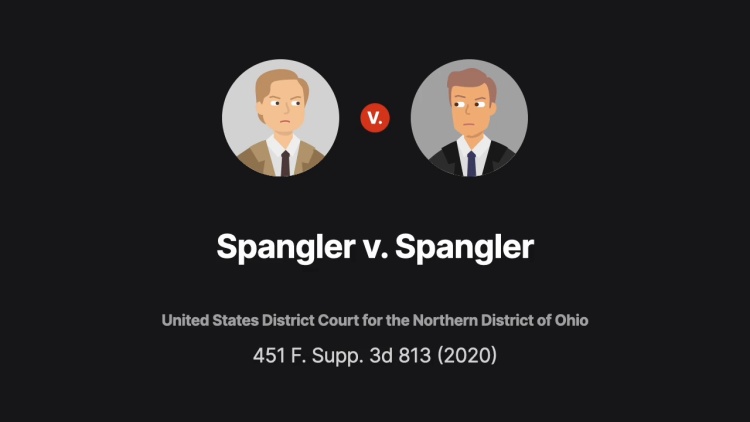Spangler v. Spangler
United States District Court for the Northern District of Ohio
451 F. Supp. 3d 813 (2020)

- Written by Mary Phelan D'Isa, JD
Facts
Ron Spangler (plaintiff) and his brother Jim Spangler (defendant) started a business in 1984. In 1991 Ron, who had been an alcoholic for 20 years, progressively declined and would come to work smelling of alcohol. In 2001 Ron was diagnosed with prostate cancer and, after a leave of absence, returned to work addicted to Vicodin and alcohol. In 2006 Jim fired Ron. Jim resented that Ron continued to benefit from their business but made no contribution, so Jim set up a new business with Jim’s wife and transferred the original company’s work to the new business. In 2014 Ron was diagnosed with terminal cancer and, according to his daughter Ronda, was self-medicating with drugs and alcohol, had possible senility, showed signs of mental incompetence, and required help from his children to perform daily activities. In 2015, without informing his children, Ron agreed to sell his shares to Jim after declining a dozen previous offers. Jim and his wife testified that Ron appeared exceptionally well and sober at the signing, but they admitted to knowing about Ron’s drug and alcohol addictions. The agreement gave Ron a modest down payment with monthly installments that yielded Ron about 8 percent of the shares’ value and a loss of rental income by the time of his death. Ronda learned of the sale months later. Ron told her that Jim instructed Ron to hide the documents, which Ron believed merely increased his rental income from the business with Jim. When Ronda explained the true nature of the agreement, Ron became angry and filed suit against Jim, Jim’s wife, and the new business. Ron died in 2016, and his estate sought avoidance of the contract, alleging incapacity to contract, unconscionability, and fraud. Jim, his wife, and the new business moved for summary judgment.
Rule of Law
Issue
Holding and Reasoning (Helmick, J.)
What to do next…
Here's why 911,000 law students have relied on our case briefs:
- Written by law professors and practitioners, not other law students. 47,100 briefs, keyed to 997 casebooks. Top-notch customer support.
- The right amount of information, includes the facts, issues, rule of law, holding and reasoning, and any concurrences and dissents.
- Access in your classes, works on your mobile and tablet. Massive library of related video lessons and high quality multiple-choice questions.
- Easy to use, uniform format for every case brief. Written in plain English, not in legalese. Our briefs summarize and simplify; they don’t just repeat the court’s language.





